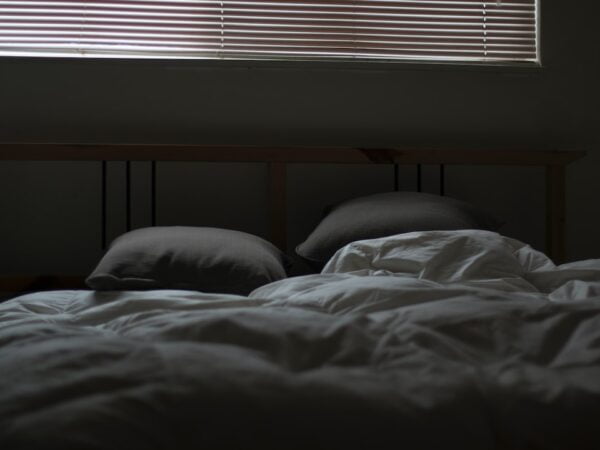
The Vital Connection Between Sleep and Mental Health: Why Getting Enough Rest is Crucial for Your Well-Being
Sleep is a fundamental aspect of our lives, yet it is often overlooked when it comes to mental health. Many people fail to recognize the crucial role that sleep plays in maintaining good mental health. In this blog post, we will explore the importance of sleep for mental health and discuss the various ways in which sleep affects our overall well-being. By understanding the relationship between sleep and mental health, we can prioritize good sleep habits and improve our overall quality of life.
Key Takeaways
- Sleep is crucial for maintaining good mental health.
- Lack of sleep can have negative effects on mental health, including mood disorders and anxiety.
- Depression is strongly linked to poor sleep quality and duration.
- Sleep is important for cognitive function and overall brain health.
- Practicing good sleep hygiene and seeking treatment for sleep disorders can improve mental health outcomes.
The Importance of Sleep for Mental Health
Sleep is essential for maintaining good mental health. It allows our bodies and minds to rest and recharge, preparing us for the challenges of the day ahead. When we sleep, our brains undergo important processes that help regulate our emotions, consolidate memories, and restore cognitive function. Without sufficient sleep, these processes are disrupted, leading to a decline in mental health.
Sleep affects various aspects of mental health. It plays a crucial role in regulating our emotions and mood. When we are sleep-deprived, we are more likely to experience irritability, mood swings, and increased stress levels. Lack of sleep can also impair our ability to think clearly and make decisions, leading to decreased cognitive function. Additionally, sleep deprivation has been linked to an increased risk of developing mental health disorders such as anxiety and depression.
The Effects of Sleep Deprivation on Mental Health
Sleep deprivation can have numerous negative effects on mental health. When we consistently fail to get enough sleep, our bodies and minds suffer the consequences. One of the most immediate effects of sleep deprivation is impaired cognitive function. Lack of sleep can lead to difficulties with memory, concentration, and problem-solving skills. This can have a significant impact on our daily lives, affecting our performance at work or school.
Sleep deprivation also affects our emotional well-being. When we are sleep-deprived, we are more likely to experience mood swings, irritability, and increased stress levels. This can make it difficult to regulate our emotions and cope with everyday challenges. In the long term, chronic sleep deprivation can increase the risk of developing mental health disorders such as anxiety and depression.
The Relationship Between Sleep and Mood Disorders
| Study | Sample Size | Findings |
|---|---|---|
| Harvard Medical School (2019) | 40,000 adults | Insomnia increases risk of depression by 5 times |
| University of Pennsylvania (2018) | 1,000 adolescents | Short sleep duration linked to increased risk of anxiety and depression |
| University of California, Berkeley (2017) | 35 adults | One night of sleep deprivation can increase symptoms of depression by 30% |
| Johns Hopkins University (2016) | 1,200 adults | Chronic insomnia linked to increased risk of bipolar disorder |
There is a strong link between sleep and mood disorders such as bipolar disorder and seasonal affective disorder (SAD). Bipolar disorder is characterized by extreme mood swings, ranging from manic episodes to depressive episodes. Sleep disturbances are common in individuals with bipolar disorder, with many experiencing insomnia during manic episodes and hypersomnia during depressive episodes.
Seasonal affective disorder is a type of depression that occurs during specific seasons, typically winter. Sleep disturbances are also common in individuals with SAD, with many experiencing increased sleepiness and fatigue during the winter months. The relationship between sleep and mood disorders is complex, with sleep disturbances often exacerbating mood symptoms and vice versa.
Sleep and Anxiety: How Lack of Sleep Can Worsen Symptoms
Sleep and anxiety have a bidirectional relationship. On one hand, anxiety can make it difficult to fall asleep or stay asleep, leading to sleep disturbances. On the other hand, lack of sleep can worsen anxiety symptoms. When we are sleep-deprived, our brains are more reactive to negative stimuli, making us more prone to anxiety and stress.
Sleep deprivation also affects our ability to regulate our emotions, making it more difficult to cope with anxiety. When we are sleep-deprived, we are more likely to experience heightened emotional reactivity and have difficulty managing stress. This can lead to increased anxiety symptoms and a decreased ability to cope with everyday challenges.
Sleep and Depression: The Link Between Sleep and Low Mood
Sleep and depression are closely intertwined. Many individuals with depression experience sleep disturbances, such as insomnia or hypersomnia. Insomnia is characterized by difficulty falling asleep or staying asleep, while hypersomnia is characterized by excessive daytime sleepiness. These sleep disturbances can worsen depressive symptoms and make it more difficult to recover from depression.
Sleep also plays a role in regulating our mood. When we are sleep-deprived, our brains are less able to regulate emotions, leading to increased negative emotions and decreased positive emotions. This can contribute to the development or worsening of depressive symptoms. Additionally, lack of sleep can lead to fatigue and low energy levels, which are common symptoms of depression.
Sleep and Cognitive Function: Why Sleep is Crucial for Brain Health
Sleep is crucial for maintaining optimal cognitive function. When we sleep, our brains undergo important processes that help consolidate memories, process information, and restore cognitive abilities. Without sufficient sleep, these processes are disrupted, leading to decreased cognitive function.
Lack of sleep can impair our ability to concentrate, make decisions, and think clearly. It can also affect our memory, making it more difficult to retain and recall information. This can have a significant impact on our daily lives, affecting our performance at work or school. In the long term, chronic sleep deprivation can increase the risk of developing cognitive disorders such as dementia.
Sleep Hygiene: Tips for Improving Sleep Quality
Improving sleep hygiene is essential for maintaining good mental health. Here are some tips for improving sleep quality:
1. Stick to a regular sleep schedule: Go to bed and wake up at the same time every day, even on weekends.
2. Create a relaxing bedtime routine: Engage in activities that promote relaxation, such as reading a book or taking a warm bath.
3. Create a sleep-friendly environment: Make sure your bedroom is dark, quiet, and at a comfortable temperature.
4. Limit exposure to screens before bed: The blue light emitted by screens can interfere with your body’s natural sleep-wake cycle. Avoid using electronic devices for at least an hour before bed.
5. Avoid caffeine and alcohol: Both caffeine and alcohol can disrupt sleep. Avoid consuming these substances close to bedtime.
6. Exercise regularly: Regular exercise can improve sleep quality. However, avoid exercising too close to bedtime, as it can make it difficult to fall asleep.
7. Manage stress: Stress can interfere with sleep. Practice stress management techniques such as deep breathing, meditation, or journaling.
Treating Sleep Disorders to Improve Mental Health
Treating sleep disorders is crucial for maintaining good mental health. If you suspect that you have a sleep disorder, it is important to seek professional help. A healthcare provider can diagnose and treat sleep disorders, helping you improve your sleep quality and overall mental well-being.
Treatment options for sleep disorders vary depending on the specific condition. In some cases, lifestyle changes and good sleep hygiene practices may be sufficient to improve sleep quality. In other cases, medication or therapy may be necessary. Cognitive-behavioral therapy for insomnia (CBT-I) is a common treatment for insomnia and has been shown to be effective in improving sleep quality.
Prioritizing Sleep for Optimal Mental Health
In conclusion, sleep plays a crucial role in maintaining good mental health. Lack of sleep can have numerous negative effects on our overall well-being, including impaired cognitive function, increased risk of developing mental health disorders, and worsened symptoms of anxiety and depression. By prioritizing good sleep habits and seeking treatment for sleep disorders, we can improve our mental health and overall quality of life. So, make sure to prioritize your sleep and give your mind the rest it deserves.
FAQs
What is the relationship between sleep and mental health?
Sleep and mental health are closely related. Lack of sleep can lead to mental health problems such as anxiety and depression, while mental health problems can also cause sleep disturbances.
How much sleep do adults need?
Adults need an average of 7-9 hours of sleep per night to maintain good mental and physical health.
What are the consequences of sleep deprivation?
Sleep deprivation can lead to a range of negative consequences, including impaired cognitive function, mood swings, and increased risk of accidents and injuries.
How can sleep improve mental health?
Getting enough sleep can improve mental health by reducing stress, improving mood, and enhancing cognitive function.
What are some tips for improving sleep?
Tips for improving sleep include establishing a regular sleep schedule, creating a relaxing sleep environment, avoiding caffeine and alcohol before bedtime, and engaging in regular exercise.


















